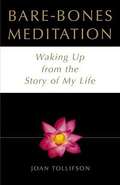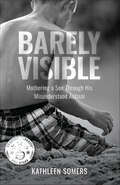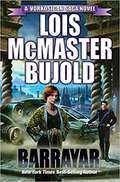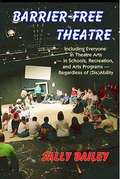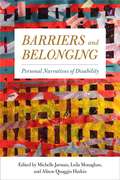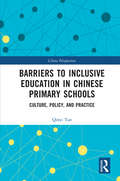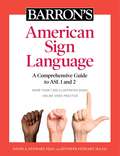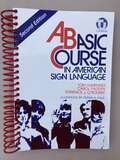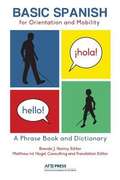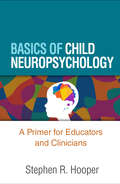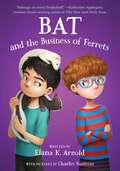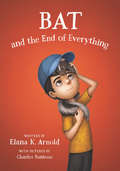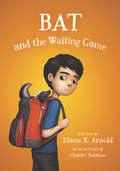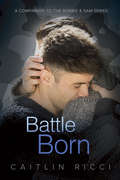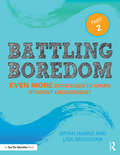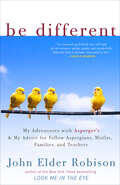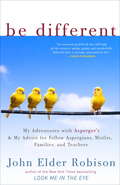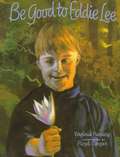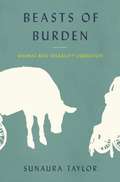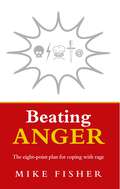- Table View
- List View
Banner Forward! The Pictorial Biography of a Guide Dog
by Eva RappaportFrom the Book Jacket: "Banner, Forward!" relates the dramatic development of a Golden Retriever from birth to maturity as a competent guide dog for the blind. Self-realization, the satisfaction one gets from doing the best one can, is a theme which threads through the three major relationships in Banner's life with human beings: her relationship with Jesse, the boy who raises her; with Scott, the man who trains her; and with June, the woman who loves and cares for her and who depends on her for sight. Each is a story in itself and could stand alone. But all contribute to tell Banner's story-the true story of a dog whose every phase of development was influenced toward the goal of doing an important job well, and doing it happily-fulfilling her potential capacities to work and to love. Mrs. Rappaport's description of train ing methods and programs is careful and accurate, based on the work of Guide Dogs for the Blind in San Rafael, California. But because of her special ability to understand and appreciate the quality of man-dog relationships, "Banner, Forward!" is also a fascinating and moving documentary. EVA RAPPAPORT is a professional photographer and an animal breeder and trainer. She is also every animal's friend. Her household has included opossums, otters, a cashmere rat, and a Bantam hen-not to mention dogs. Needless to say, her husband and three children share her great interest in animals. Mrs. Rappaport was born in Vienna, Austria, and graduated from Cooper Union Art School in New York. She and her family now live in Los Angeles.
Barbie: Girl's Best Friend
by Rita BalducciBarbie agrees to let Stacie train a guide-dog puppy, and her little sister does a great job. But all too soon, Stacie must choose between giving up her beloved pet--and gaining more than she ever thought possible. Picture descriptions present.
Barbie: Three Cheers for Becky
by Lynn OffermanWhen Skipper and her pals need a coach for their new cheerleading squad, Barbie's friend Becky is happy to lend a hand. But when one teammate loses her nerve before the first competition, Becky teaches the girls the true meaning of teamwork and trust.
Bare Bones Meditation: Waking Up from the Story of My Life
by Joan TollifsonBorn with only one hand, Joan Tollifson grows up feeling different, finds identity as a bisexual lesbian and a disability rights activist, but also sinks into drug addiction and alcoholism. She embraces Zen Buddhism and then a very bare-bones spirituality that has no form. Bare-Bones Meditation reveals the inner process of the mind in a new way, and Tollifson's account is beautifully written--intense and from the heart.
Barely Visible: Mothering a Son Through His Misunderstood Autism
by Kathleen SomersFor any parent who has ever struggled with a child’s difficult or peculiar behavior, this candid and compelling memoir about raising a child on the spectrum offers reassurance that you are not alone—and a path forward is possible.Although Asperger syndrome is considered a form of autism, few people are aware of its existence and even fewer can recognize it. Barely Visible is not a series of helpful hints and best practices, or a heroic tale of a champion parent. It is a relatable story of one mother’s struggle with the gray space between her son appearing normal on the surface and being not quite normal beneath it. Walking that fine line between when to say something and when to bite your tongue, hoping your child can handle life on his own, requires tremendous discernment and energy. How do you convince others to “cut your child some slack” when the kid they see looks like every other kid they know? How do you explain away behavior that, at face value, looks like the result of bad parenting? And how do you prevent others from discriminating against your child once you do disclose their disability? Chronicling a journey spanning twenty-three years, Barely Visible is a mother’s admission of guilt for choosing to ignore her son’s diagnosis initially; acceptance of defeat, for rarely knowing the right thing to do; and an acknowledgment of love—not only for her son, but for herself.
Barrayar (Cordelia Naismith #2)
by Lois Mcmaster BujoldSequel to Shards of Honor, chronicling the events leading up to Miles Naismith Vorkosigan's birth.<P><P> Cordelia Vorkosigan's plans for a peaceful married life (after all the bloodshed and trials recounted in SHARDS OF HONOR) are shattered when a poison gas attack, intended for her husband Aral, leaves her ill and her unborn child damaged. Resisting enormous pressure to abort her son, Cordelia struggles to keep her unborn child--transferred to a uterine replicator--alive while thwarting plans by a ruthless opponent to murder the young emperor and assume absolute power over all of Barrayar. Once again Cordelia displays her courage and her remarkable combat and leadership skills.<P> Winner of the Hugo Award for Best Novel.
Barrier-Free Theatre
by Sally BaileyWays to use drama as a tool to teach traditional classroom subjects, such as science, social studies, and language arts, are highlighted, as well as using it for instruction in social interaction and other vital life skills.
Barriers and Belonging: Personal Narratives of Disability
by Alison Quaggin Harkin Leila Monaghan Michelle JarmanWhat is the direct impact that disability studies has on the lives of disabled people today? The editors and contributors to this essential anthology, Barriers and Belonging, provide thirty-seven personal narratives thatexplore what it means to be disabled and why the field of disability studies matters. The editors frame the volume by introducing foundational themes of disability studies. They provide a context of how institutions—including the family, schools, government, and disability peer organizations—shape and transform ideas about disability. They explore how disability informs personal identity, interpersonal and community relationships, and political commitments. In addition, there are heartfelt reflections on living with mobility disabilities, blindness, deafness, pain, autism, psychological disabilities, and other issues. Other essays articulate activist and pride orientations toward disability, demonstrating the importance of reframing traditional narratives of sorrow and medicalization. The critical, self-reflective essays in Barriers and Belonging provide unique insights into the range and complexity of disability experience.
Barriers to Inclusive Education in Chinese Primary Schools: Culture, Policy, and Practice (China Perspectives)
by Qinyi TanIn response to the growing international interest in inclusive education, this book examines its practices and issues in the Chinese context through case studies of two regular primary schools in mainland China where children with special needs are admitted. The main concerns of this book not only involve the inclusion of children with disabilities, but also those with special educational needs but without physical and sensory difficulties, such as children from socially and economically disadvantaged groups, children from diverse cultural and linguistic groups, and children alienated in classrooms. This book discusses these issues and challenges against the background of the existing educational system and policy, and identifies the barriers to their inclusion in current school education, such as lack of in-service training for teachers, limited involvement of local communities, big class size, and corporal punishment, etc. Academics and postgraduate students in the field of inclusive education, social education, and Chinese studies will find this book useful, as well as policy makers, school teachers, and administrators.
Barron's American Sign Language: A Comprehensive Guide to ASL 1 and 2 with Online Video Practice
by David A. Stewart Jennifer StewartBarron&’s American Sign Language is a brand-new title on ASL that can be used in the classroom, as a supplemental text to high school and college courses, or for anyone who wants to learn proper ASL.The only book with comprehensive instruction and online graded video practice quizzes, plus a comprehensive final video exam.Content includes topics on the Deaf culture and community, ASL Grammar, fingerspelling, combining signs to construct detailed sentences, Everyday ASL, and much more.More than 1,000 illustrations of signs with instructions on movement--step-by-step with dialogue, tip boxes, and practice exercises and quizzes throughout to reinforce retention and to track your progress.
Basic Course in American Sign Language
by Tom Humphries Carol Padden Terrence J. O'Rourke Frank A. PaulThere are obvious problems with writing a text for a visual gestural language. This text attempts to alleviate some of these problems by using illustrations and scripts for signed sequences. The text is composed of 22 lessons each of which contains two to four basic explanations of the language structures to be learned. As a resource for the student, a drill or exercises follows. Spaced at intervals throughout the text are several short dialogues which review the language structures discussed in the preceding lessons.
Basic Facts About Assessment of Dyslexia
by Susan C. Lowell Rebecca H. Felton Pamela HookBasic information about testing for dyslexia.
Basic Spanish for Orientation and Mobility: A Phrase Book and Dictionary
by Brenda J. NaimyProfessionals providing services to people who are visually impaired work with individuals from broadly diverse ethnic, religious, and cultural groups. Many speak languages other than English. Basic Spanish for Orientation and Mobility is a new user-friendly, valuable tool for communicating O&M instruction to students who primarily speak Spanish. This handy and comprehensive manual provides O&M lessons broken down step-by-step and displayed side-by-side in English and Spanish. It also includes phrases and O&M terminology needed to convey instruction, and easy-to-read vocabulary lists
Basics of Child Neuropsychology: A Primer for Educators and Clinicians
by Stephen R. HooperWritten expressly for non-neuropsychologists, this book offers a concise, friendly introduction to the developing brain and its functions. Stephen R. Hooper renders complex concepts accessible as he describes the structure of the brain and the workings of the nervous system. The book explains how findings from neuropsychological assessments can help educators and clinicians to better understand and remediate children's difficulties. A range of neurodevelopmental and medical conditions that affect learning and behavior from early childhood through adolescence are explored through a neuropsychological lens. Helpful features include key Take-Home Points distilled from the chapters and recommended print and online resources.
Bat and the Business of Ferrets (The Bat Series #4)
by Elana K. ArnoldThe bestselling Bat returns! Bat and the Business of Ferrets is the fourth title in National Book Award finalist Elana K. Arnold’s heartfelt and widely acclaimed series featuring an unforgettable young boy on the autism spectrum.Bixby Alexander Tam (nicknamed “Bat”) is about to start fourth grade—and unfortunately for him, everything is changing: There's a new teacher, a new classroom, new seats…and new rules. Mr. Grayson, Bat’s third grade teacher, had a lovable class rabbit named Babycakes who Bat could visit anytime he needed a break. But Mr. Peña does not have a class rabbit. In fact, Mr. Peña doesn't believe in class pets at all. And for Bat, that’s one change too many.Bat and his best friend, Israel, know they need to convince Mr. Peña to change his mind about class pets—and when a business of friendly ferrets arrives at Bat's mom's veterinary clinic, they think they've found the perfect pet to do so. But when they discover that their classmate Lucca also doesn't like the idea of an animal in the classroom, Bat starts to worry that things will never be the way they were again.
Bat and the End of Everything
by Elana K. ArnoldThe third book in the funny and joyful series Katherine Applegate has called “tender and important,” by National Book Award finalist Elana K. Arnold. Bixby Alexander Tam (nicknamed Bat) has been the caretaker for Thor, the best skunk kit in the world...but the last day of third grade is quickly approaching, and Thor is almost ready to be released into the wild.The end of school also means that Bat has to say good-bye to his favorite teacher, and he worries about the summer care of Babycakes, their adorable class pet. Not only that, but his best friend is leaving for a long vacation in Canada.Summer promises good things, too, like working with his mom at the vet clinic and hanging out with his sister, Janie. But Bat can’t help but feel that everything is coming to an end.National Book Award finalist Elana K. Arnold returns with the third story starring an unforgettable boy on the autism spectrum.
Bat and the Waiting Game
by Elana K. Arnold Charles SantosoIn the tradition of Clementine and Ramona Quimby, meet Bat. Author Elana K. Arnold returns with another irresistible story of friendship in this widely acclaimed series starring an unforgettable boy on the autism spectrum.For Bixby Alexander Tam (nicknamed Bat), life is pretty great. He’s the caretaker of the best baby skunk in the world—even Janie, his older sister, is warming up to Thor. When Janie gets a part in the school play and can’t watch Bat after school, it means some pretty big changes. Someone else has to take care of the skunk kit in the afternoons, Janie is having sleepovers with her new friends, and Bat wants everything to go back to normal.He just has to make it to the night of Janie’s performance. . . .
Battle Born (Robbie & Sam)
by Caitlin RicciA Companion to the Robbie & Sam SeriesDaniel Messana wanted a way out of Thornwood, Colorado, and he found it in the Army. Now he’s returned with no more direction to his life than he had when he left as an angry teenager. And even though the war is behind him, the things he experienced won’t leave him in peace. His PTSD plagues him in crowds, and isolation sets in when he’s by himself. Because of the way he treated his brothers, regret gnaws at him, and he has no family to turn to. For Franklin “Coop” Cooper, the Army was life, and one he loved. But when an IED in Afghanistan left him blind, it ended not only the career he’d built, but any chance of being his own man. Back home, his parents refuse to let him do anything for himself, even though Coop and his service dog are ready to move forward and adjust to his new conditions. His only escape from being coddled like a child is going for pizza on base while his mother shops on Fridays. There, Daniel sits down next to him, and the two men begin a friendship that could become more—if they can break free from everything holding them back.
Battling Boredom, Part 2: Even More Strategies to Spark Student Engagement
by Bryan Harris Lisa BradshawDrive boredom out of your classroom—and keep it out—with the student engagement strategies in this book. In the first Battling Boredom, bestselling author Bryan Harris offered strategies on beginning a lesson, ending a lesson, small group work, and large group work. Now in Battling Boredom Part 2, Harris teams up with technology integration expert and former teacher Lisa Bradshaw to provide additional strategies on new topics such as academic talk, feedback, writing, classroom technology, and more. You’ll learn how to: Increase the quality and effectiveness of feedback to boost student performance. Engage students in meaningful reflection with writing prompts and exercises. Reenergize a lethargic class using movement-based activities. Integrate technology to create a more enriching classroom experience for students. Encourage students to speak up, share their ideas, and talk about their learning. With this toolbox of instructional strategies, you’ll have even more ways to end student boredom before it begins, resulting in class time that’s more efficient, more educational, and loads more fun!
Be Different: Adventures of a Free-Range Aspergian with Practical Advice for Aspergians, Misfits, Families & Teachers
by John Elder Robison"I believe those of us with Asperger's are here for a reason, and we have much to offer. This book will help you bring out those gifts." In his bestselling memoir, Look Me in the Eye, John Elder Robison described growing up with Asperger's syndrome at a time when the diagnosis didn't exist. He was intelligent but socially isolated; his talents won him jobs with toy makers and rock bands but did little to endear him to authority figures and classmates, who were put off by his inclination to blurt out non sequiturs and avoid eye contact.By the time he was diagnosed at age forty, John had already developed a myriad of coping strategies that helped him achieve a seemingly normal, even highly successful, life. In Be Different, Robison shares a new batch of endearing storiesabout his childhood, adolescence, and young adult years, giving the reader a rare window into the Aspergian mind.In each story, he offers practical advice--for Aspergians and indeed for anyone who feels "different"--on how to improve the weak communication and social skills that keep so many people from taking full advantage of their often remarkable gifts. With his trademark honesty and unapologetic eccentricity, Robison addresses questions like:* How to read others and follow their behaviors when in uncertain social situations* Why manners matter* How to harness your powers of concentration to master difficult skills* How to deal with bullies* When to make an effort to fit in, and when to embrace eccentricity* How to identify special gifts and use them to your advantageEvery person, Aspergian or not, has something unique to offer the world, and every person has the capacity to create strong, loving bonds with their friends and family. Be Different will help readers and those they love find their path to success.
Be Different: Adventures of a Free-range Aspergian
by John Elder Robison"I believe those of us with Asperger's are here for a reason, and we have much to offer. This book will help you bring out those gifts." In his bestselling memoir, Look Me in the Eye, John Elder Robison described growing up with Asperger's syndrome at a time when the diagnosis didn't exist. He was intelligent but socially isolated; his talents won him jobs with toy makers and rock bands but did little to endear him to authority figures and classmates, who were put off by his inclination to blurt out non sequiturs and avoid eye contact. By the time he was diagnosed at age forty, John had already developed a myriad of coping strategies that helped him achieve a seemingly normal, even highly successful, life. In Be Different, Robison shares a new batch of endearing stories about his childhood, adolescence, and young adult years, giving the reader a rare window into the Aspergian mind.In each story, he offers practical advice--for Aspergians and indeed for anyone who feels "different"--on how to improve the weak communication and social skills that keep so many people from taking full advantage of their often remarkable gifts. With his trademark honesty and unapologetic eccentricity, Robison addresses questions like: * How to read others and follow their behaviors when in uncertain social situations * Why manners matter * How to harness your powers of concentration to master difficult skills * How to deal with bullies * When to make an effort to fit in, and when to embrace eccentricity * How to identify special gifts and use them to your advantage. Every person, Aspergian or not, has something unique to offer the world, and every person has the capacity to create strong, loving bonds with their friends and family. Be Different will help readers and those they love find their path to success.
Be Good to Eddie Lee
by Virginia FlemingMama has always told Christy to be good to Eddie Lee because he was "different". But did that mean she had to let him follow her around all summer? This sensitive portrayal of a young Down's Syndrome child shows young readers the joy of unconditional friendship.
Beasts of Burden: Animal and Disability Liberation
by Sunaura TaylorA deeply provocative inquiry into the intersection of animal and disability liberation and the debut of an important new social critic How much of what we understand of ourselves as "human" depends on our physical and mental abilities how we move (or cannot move) in and interact with the world? And how much of our definition of "human" depends on its difference from "animal"? Drawing on her own experiences as a disabled person, a disability activist, and an animal advocate, author Sunaura Taylor persuades us to think deeply, and sometimes uncomfortably, about what divides the human from the animal, the disabled from the non-disabled and what it might mean to break down those divisions, to claim the animal and the vulnerable in ourselves, in a process she calls "cripping animal ethics." Beasts of Burden suggests that issues of disability and animal justice which have heretofore primarily been presented in opposition are in fact deeply entangled. Fusing philosophy, memoir, science, and the radical truths these disciplines can bring whether about factory farming, disability oppression, or our assumptions of human superiority over animals Taylor draws attention to new worlds of experience and empathy that can open up important avenues of solidarity across species and ability. Beasts of Burden is a wonderfully engaging and elegantly written work, both philosophical and personal, by a brilliant new voice.
Beating Anger: The eight-point plan for coping with rage
by Mike FisherWe all feel angry at times. It can be an uncomfortable emotion, yet it is almost a taboo subject. We get very little guidance in our culture on how to deal with it, and the guilt or violence that may accompany it. Here is the perfect book to help anyone from 16-75 years old to beat their anger - or help anyone else to do the same. Aimed at parents, families, young adults and teachers, social and youth workers, health care professionals, managers, customer service departments, psychotherapists and counsellors - there cannot be many men or women who have not felt uncomfortable when they are angry, and wondered what to do about it. The British Association of Anger Management (BAAM) is considered the leading specialist organization in the field. Founded by Mike Fisher in 2001, its mailing list reaches approximately 10,000 people a month and it receives enquiries from all over the world, and from all walks of life. Beating Anger is endorsed by BAAM, and used on all its anger management courses. It explains what anger is, what triggers it, the various different types of anger - and its substitutes - how to heal emotional aggression, and the 8 Golden Rules of Anger Management.

